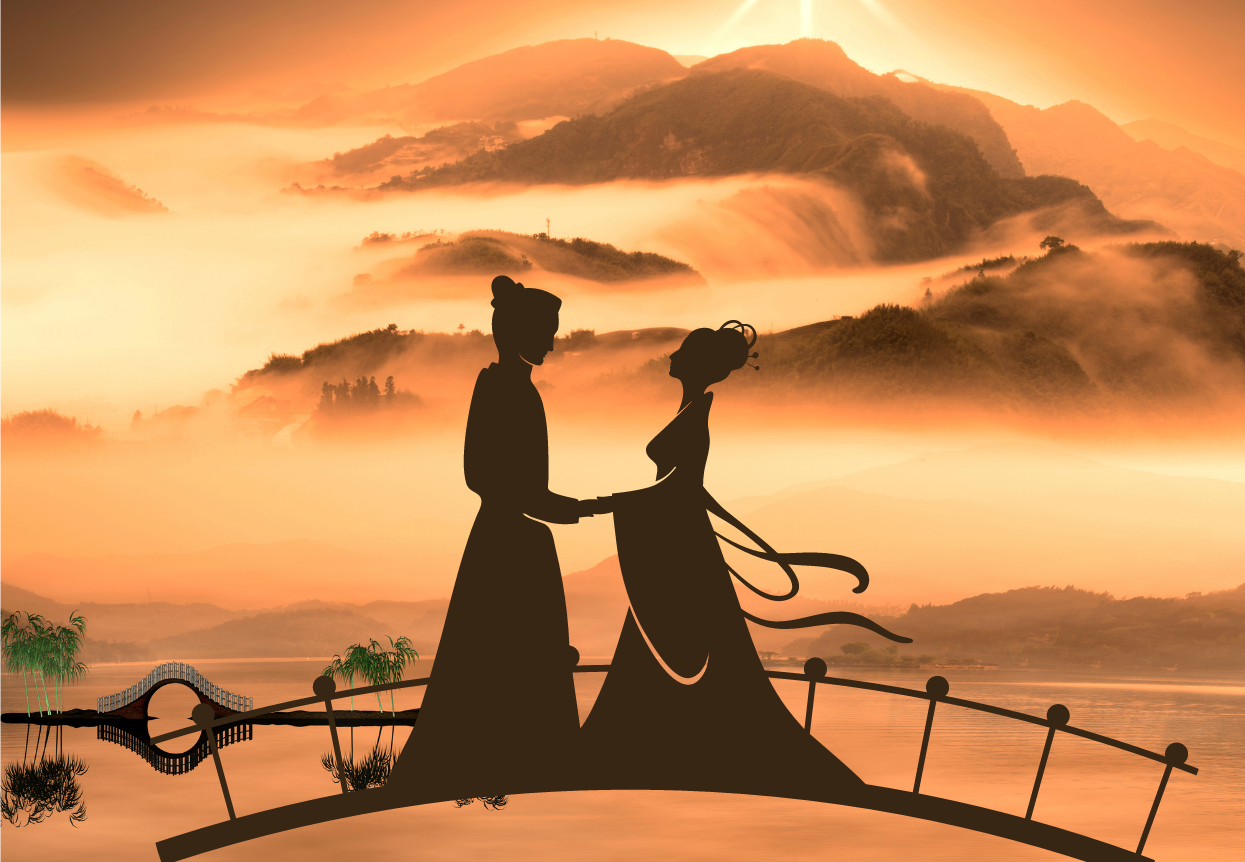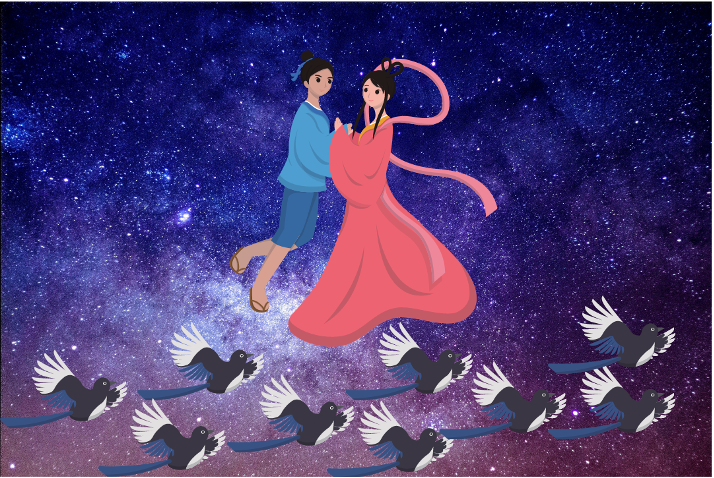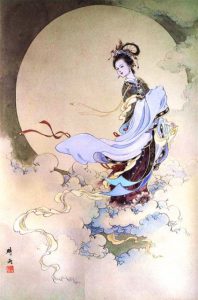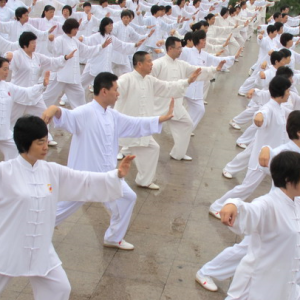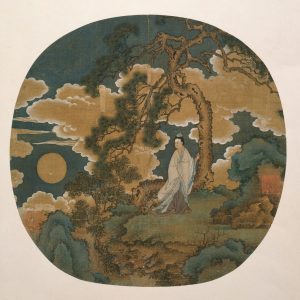Written by Mikayla Alba
Edited by Nikka Gan and Regiena Siy
Love stories don’t always end in happily ever after. Sometimes, events turn bittersweet and lovers don’t always stay together until the end. We’ve all heard of the famous stories of Romeo and Juliet, The Sleeping Beauty, and Cinderella, but Chinese folktales and mythology have many underrated love stories as well.
1. Butterfly Lovers (梁祝)
Being a woman today has its own difficulties, so what more during the Eastern Jin Dynasty when women barely had the chance to make choices for themselves? A lady named Zhu Yingtai (祝英台) wanted to pursue her dream of becoming a scholar, but universities would not accept her because she was a woman. So, she disguised herself as a man to pursue her studies. While studying, she met a man named Liang Shanbo (梁山伯), her classmate who came from a poor family but was smart. They spent time together and became close; they treated each other like brothers. Eventually, Zhu realized that she was in love with him. She started dropping hints of her femininity as she was about to leave for home, but Liang was unable to pick up her signals. Before leaving, she told him to marry her sister, which was going to be her, and Liang agreed to this. Unfortunately, Zhu’s father had already arranged a fixed marriage for her with Ma Wencai (马文才). Liang learned about this and was heartbroken; this pain brought him to his death. Zhu was deeply hurt by this, but she proceeded with her wedding. During the procession, they passed through Liang’s grave. Zhu Yingtai stopped the procession and went to his tomb, begging for it to be opened. Suddenly, thunder roared in the skies and the tomb opened. Zhu climbed inside and closed it. When people opened it again to rescue Zhu, they were surprised to see it empty except for two butterflies that flew out of the grave. The two lovers ended up together once again.
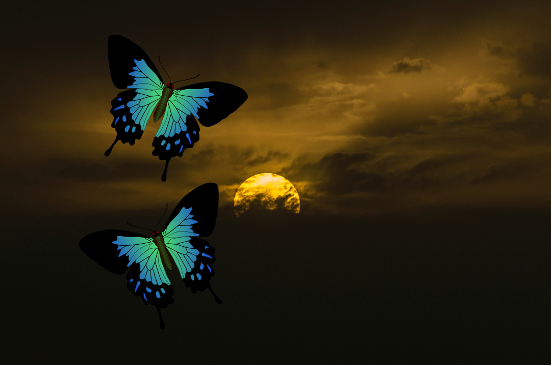
The original title of the story is Liang Zhu (梁祝), a combination of the two lovers’ names. This story is often likened to William Shakespeare’s Romeo and Juliet because of its tragic end.
2. Chang’e Flies to the Moon (嫦娥奔月)
Power is one of the things that make humans greedy, but not everyone is like that. In one version of the story, a man named Hou Yi (后羿) saved the world from suffering by shooting down the nine suns that were drying up lakes and causing severe drought. Because of his heroic act, he became a well-respected man and attracted a lot of disciples who wished to learn from him. The Queen of the Heavens rewarded this heroism with an elixir of immortality. However, he did not want to become immortal and knew that it would be bad if the elixir went into the wrong hands, so he gave it to his wife, Chang’e (嫦娥), for safekeeping. One day, as he and his disciples went hunting, one of his treacherous followers, Peng Meng (逢蒙) pretended to be sick. He stayed behind and went to Hou Yi’s house. He threatened to kill Chang’e if she didn’t surrender the elixir, and she knew that she wouldn’t be able to protect it. Instead, she drank the elixir to keep Peng Meng from obtaining it. Suddenly, Chang’e began to fly. She went higher and higher until she landed on the moon. When Hou Yi got back home, he was enraged when he learned what had happened, but at this point, he couldn’t do anything as Peng Meng had already escaped. Since then, he had prepared mooncakes that were the favorite snacks of Chang’e every 15th day of the 8th lunar month in their backyard as a sacrifice. As people also loved Chang’e, they followed Hou Yi’s tradition.

Chang’e remained immortal, while Hou Yi stayed on Earth as a human. The love story behind the Mooncake Festival really is a tragic love story.
3. Niulang and Zhinu (牛郎织女)
To live as a star or a god may seem fun, but only if one is free to love whoever they want. Niulang (牛郎) , known as the star Altair, and Zhinu (织女), known as the star Vega, once lived together in the galaxy but fell in love and offended the Queen Mother. Thus, the Queen Mother exiled Niulang to Earth, where his life became difficult. His parents passed away and his brother treated him harshly. He was left to fend for himself only with a cow and cart. One day, this cow told him that if he went to the lake and stole one of the red robes from there, he would find his wife. During this time, Zhinu’s sisters had asked their Queen Mother to allow them to bathe in a lake on Earth. It was fortunate that she agreed, as she felt some sympathy towards Zhinu. There, they were shocked when a man arrived and stole Zhinu’s robe. The sisters all flew back home, leaving Zhinu behind. The man promised Zhinu that if she married him, he would return her robe. Eventually, Zhinu realized that he was her long-lost lover, so she stayed on Earth, and they had two children. Before Niulang’s cow died, it told them that they should use his cowhide to help them fly back to the heavens when the time comes. Niulang then realized that the cow was a god who used to be his friend before he was sent to Earth. This friend was then exiled by the Queen Mother as well for defending Niulang. When the Queen Mother learned about their relationship, she summoned Zhinu back to her. Niulang wore the cowhide and flew to the heavens along with his children, hoping to reunite with his wife. The Queen Mother got angry and removed her golden hairpin, forming the milky way between the two lovers so that Zhinu and Niulang could never meet again. However, their love was so strong that it moved her, so she allowed them to meet only on the seventh day of the seventh month of the lunar calendar where a flock of magpies would form a bridge for them to meet.
The ending of Niulang and Zhinu is bittersweet as they can only meet once a year, but their love has remained strong despite the hurdles. Love is never easy, especially with a strict mother, but this story symbolizes Chinese Valentine’s Day or Qixi Festival.
These romance stories from Chinese mythology have their own uniqueness and endings, be it tragic or happy. Regardless of the endings, they have contributed so much to our celebration of various holidays and practices in Chinese culture and history.
This article is brought to you by the Documentation and Publications department of Ateneo Celadon and Elements Magazine on Facebook: https://www.facebook.com/CeladonElementsMagazine

